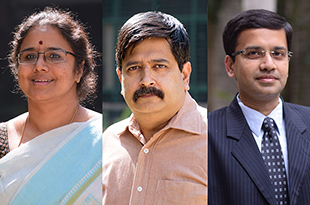Journal Article: 'Multi-level gaps: a study of intended, actual and experienced human resource practices in a hypermarket chain in India' - Upam Pushpak Makhecha,Vasanthi Srinivasan, Ganesh N. Prabhu and Sourav Mukherji

Abstract: Multi-level (Multi-level in this paper refers to three levels- intended, actual and experienced- at which HR practices are theorised in the existing strategic human resource management process research) gaps in human resource (HR) practices have not been extensively investigated in the HR literature. Using a multiple embedded case study design within a multi-unit hypermarket chain in India, we identify ‘Intended-Actual-Experienced’ gaps across nine HR practices in seven retail units. We find that these gaps arise from implementers’ adaptation of HR practices due to different understandings of the intent of HR practices, the importance given to their contents and the processes adopted in their implementation. We propose an inductive model for emergence of multi-level gaps in HR practices. Our model depicts the processes and variables that have the potential to enable or disable adaptation, delivery and experience of HR practices, thus creating gaps between intended and experienced HR practices. This paper highlights the need for further research on HR implementation with particular focus on gaps. It also provides a framework for practitioners to take cognisance of the gaps that could impact implementation and experience of corporate-driven HR practices.
Authors’ Name: Upam Pushpak Makhecha,Vasanthi Srinivasan, Ganesh N. Prabhu and Sourav Mukherji
URL: http://www.tandfonline.com/doi/full/10.1080/09585192.2015.1126336
Journal: The International Journal of Human Resource Management
Volume, Issue, Page Numbers: Published online: 08 Mar 2016
Journal Article: 'Multi-level gaps: a study of intended, actual and experienced human resource practices in a hypermarket chain in India' - Upam Pushpak Makhecha,Vasanthi Srinivasan, Ganesh N. Prabhu and Sourav Mukherji

Abstract: Multi-level (Multi-level in this paper refers to three levels- intended, actual and experienced- at which HR practices are theorised in the existing strategic human resource management process research) gaps in human resource (HR) practices have not been extensively investigated in the HR literature. Using a multiple embedded case study design within a multi-unit hypermarket chain in India, we identify ‘Intended-Actual-Experienced’ gaps across nine HR practices in seven retail units. We find that these gaps arise from implementers’ adaptation of HR practices due to different understandings of the intent of HR practices, the importance given to their contents and the processes adopted in their implementation. We propose an inductive model for emergence of multi-level gaps in HR practices. Our model depicts the processes and variables that have the potential to enable or disable adaptation, delivery and experience of HR practices, thus creating gaps between intended and experienced HR practices. This paper highlights the need for further research on HR implementation with particular focus on gaps. It also provides a framework for practitioners to take cognisance of the gaps that could impact implementation and experience of corporate-driven HR practices.
Authors’ Name: Upam Pushpak Makhecha,Vasanthi Srinivasan, Ganesh N. Prabhu and Sourav Mukherji
URL: http://www.tandfonline.com/doi/full/10.1080/09585192.2015.1126336
Journal: The International Journal of Human Resource Management
Volume, Issue, Page Numbers: Published online: 08 Mar 2016

